STATEHOUSE REPORT | ISSUE 20.34 | AUG. 20, 2021
BIG STORY: Study highlights the language of vaccination
NEWS BRIEFS: High court OKs universal college mask mandate
LOWCOUNTRY, Ariail: Shooting stars
COMMENTARY, Brack: South Carolinians should expect civility, not promote incivility
SPOTLIGHT: ACLU of South Carolina
MY TURN, Inglis: Memories of an Afghan and his kites
FEEDBACK: Columnist hits the nail on the head
MYSTERY PHOTO: House with interesting past
Study highlights the language of vaccination
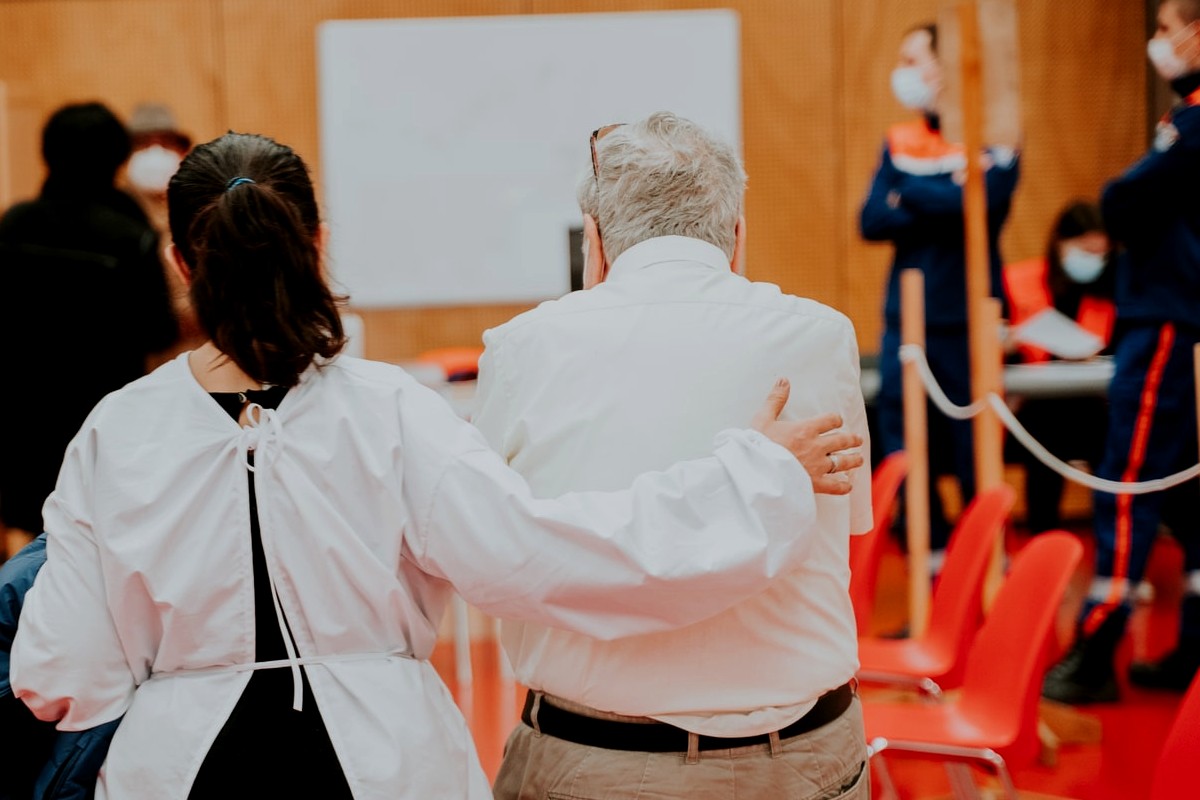
By Andy Brack, editor and publisher | A national study highlights tested ways to communicate effectively with groups of Americans who tend to be more hesitant to be vaccinated against COVID-19 — younger women, younger African Americans, rural residents and younger Republicans.
“The divides along racial, urban-rural, political and generational lines are significant when it comes to vaccine acceptance, but we’ve learned that there are certain words and phrases that will work for all audiences,” said pollster Frank Luntz about his study for the de Beaumont Foundation. In the 1990s, Luntz served as a pollster for House Speaker Newt Gingrich to rebrand Republicans via messaging. His work was used with Gingrich’s Contract with America and, many have observed, helped to increase polarization in American politics.
Luntz’s new work with the foundation illustrates how the use of language can help improve vaccine acceptance. For example, leaders should talk about the benefits of taking the vaccine, versus the consequences. Or how getting the vaccine keeps people safe, versus “getting the vaccine is the right thing to do.” It also suggests talking about “America’s leading experts” as opposed to “the world’s leading experts.”
The poll also found that appealing to family was a powerful vaccine motivator.
“Significantly more Americans said they’d be most willing to take the vaccine for their family as opposed to ‘your country,’ ‘the economy,’ ‘your community’ or ‘your friends.’”
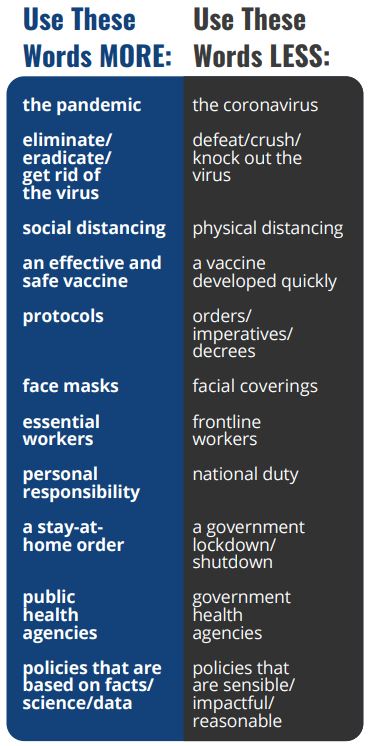 Best reasons to get the vaccine, according to poll
Best reasons to get the vaccine, according to poll
The poll suggested the three most convincing reasons to get the vaccine were:
- Effectiveness: “At 95 percent efficacy, this vaccine is extraordinarily effective at protecting you from the virus.”
- Ending the pandemic: “Vaccines will help bring this pandemic to an end.”
- Safety. “Getting vaccinated will help keep you, your family, your community and your country healthy and safe.”
Looking at four undervaccinated groups
As of this week, data show more than 360 million doses of the COVID-19 vaccine have been administered in the U.S. with 170 million Americans (51.7 percent) being fully vaccinated.
In South Carolina, like other red Southern states, the vaccination rate is lower. As of Aug. 17, 46.1 percent of eligible South Carolina residents 12 and older (1,979,845 people) have been fully vaccinated. Another 363,000 residents have had one dose, according to the S.C. Department of Health and Environmental Control.
According to Luntz’s research, done between December and March, four groups are among the most hesitant to get vaccinated. Different messages appear to work to reduce each group’s hesitancy.
Republicans, ages 18-49. Republican voters in this category have a top priority of returning to normal. Safety-related messaging doesn’t work as well, the poll said. Interestingly, these voters said they would be more likely to get vaccinated if their doctor endorsed it.
“When asked if they’d be more likely to get vaccinated if their doctor or Trump recommended it, 81 percent chose their doctor,” according to Luntz’s research. “This and other findings reveal that like other Americans, Trump voters see vaccination as a personal issue, not a political issue, and they want unbiased facts from doctors and other trusted, nonpolitical sources.
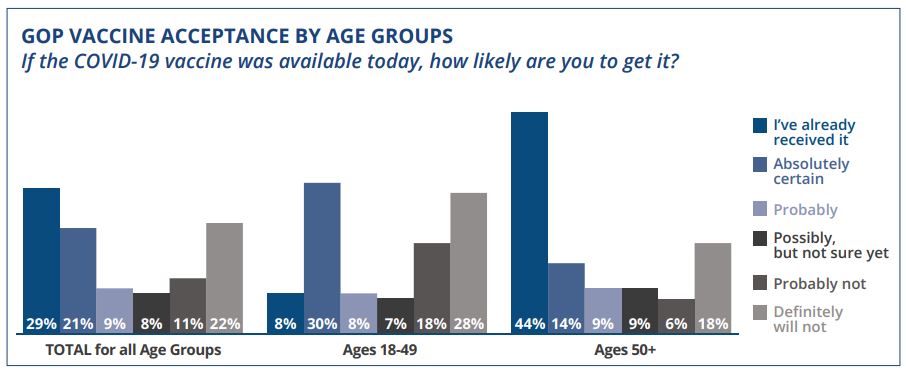
Black Americans, ages 18-49. More than 40 percent of respondents said they were worried about unknown or potential short- or long-term effects from the vaccine. Messaging about safety and benefits of vaccines seemed to be more persuasive, according to results.
Women, ages 18-49. These respondents, most of whom are of child-bearing age, were most worried about “damage from lockdowns” and the “potential for family/friends to become ill.” Keys to breaking hesitancy among them are to stress language that highlighted the importance of the vaccine addressing both issues, according to the poll.
Rural residents. Almost two in five rural residents have little confidence in the safety of vaccinations, suggesting that messages highlighting how vaccines can keep families safe may help reduce hesitancy.
“Words can save lives,” said Brian C. Castrucci, president and CEO of the de Beaumont Foundation. “Our ability to boost confidence in COVID-19 vaccines will depend largely on the language, the messengers and methods we use to communicate to Americans that the vaccine will help keep them and their families safe and healthy.”
- Have a comment? Send to feedback@statehousereport.com
High court OKs universal college mask mandate

Staff reports | A Tuesday afternoon opinion published by S.C. Supreme Court unanimously rejected interpretations by state Attorney General Alan Wilson that a state budget proviso would prohibit state colleges from enacting mask mandates.
The two-sentence item folded into the state budget says vaccinations cannot be required to be vaccinated against COVID-19 to be on campus without a mask, but makes no mention of universal mask requirements.
“Despite the fact that the proviso is, as stated by the Attorney General, ‘inartfully worded’ and ‘very poorly written,’ the proviso clearly does not not prohibit a universal mask mandate,” the justices wrote.
Soon after the ruling, colleges such as the College of Charleston and the University of South Carolina, moved forward with a mask mandate. More: Associated Press, The State, The Post and Courier, Charleston City Paper.
In other recent news headlines:
![]() Pressure increases to repeal state’s mask mandate. Lawmakers are facing increasing pressure this week to repeal a ban on the wearing of masks in public schools. School districts and counties have defied the ban as cases of COVID-19 have soared. Colleges now can require masks following a state Supreme Court decision.
Pressure increases to repeal state’s mask mandate. Lawmakers are facing increasing pressure this week to repeal a ban on the wearing of masks in public schools. School districts and counties have defied the ban as cases of COVID-19 have soared. Colleges now can require masks following a state Supreme Court decision.
Wilson sues Columbia over mask mandate. S.C. Attorney General Alan Wilson sued the state’s capital city Thursday over a school mask mandate that officials allege violates state law. The city earlier enacted an emergency ordinance to require masks for students 14 and younger to promote public health. Meanwhile, the pandemic has come back with vengeance. State health officials reported 2,116 new confirmed cases of the coronavirus Thursday alongside 43 new deaths. Of the 18,525 tests reported, 14.6 percent were positive. The state passed more than 700,000 cases this week. More than 75 percent of hospitalizations and reported deaths in South Carolina are those who are not vaccinated, according to reports.
Greenville Co. Republican leader dies from COVID-19. Pressley Stutts, a tea party Republican who recently helped turn over the party leadership in Greenville County, died from complications of COVID-19 Thursday. Stutts had previously said people should take the disease seriously, but stood against mask mandates and pressuring others to get the vaccine.
Myrtle Beach seeks 2024 GOP candidates. An October conference by the SC GOP is said to be the first to feature an array of rising GOP stars who may want to run for president.
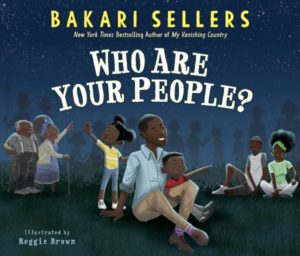 Sellers to have new children’s book. Bakari Sellers, the former state House Representative who has become a fixture on cable TV news announced today he’ll release a new children’s book next year, entitled, Who Are Your People? The book, illustrated by Reggie Brown, was created as a tribute to communities who come together and develop young people and remembers those who came before, and set the pathway for the current generation. The book will be released in January.
Sellers to have new children’s book. Bakari Sellers, the former state House Representative who has become a fixture on cable TV news announced today he’ll release a new children’s book next year, entitled, Who Are Your People? The book, illustrated by Reggie Brown, was created as a tribute to communities who come together and develop young people and remembers those who came before, and set the pathway for the current generation. The book will be released in January.
S.C. disabilities director fired again after judge rules against previous vote. The board of South Carolina’s disabilities agency fired its director for a second time, a day after a judge ruled she was illegally fired earlier this year.
Ports Authority sets container volume record. The S.C. Ports Authority reported another record-setting month with the highest July container volumes in history.
- Have a comment? Send to: feedback@statehousereport.com.
Shooting stars
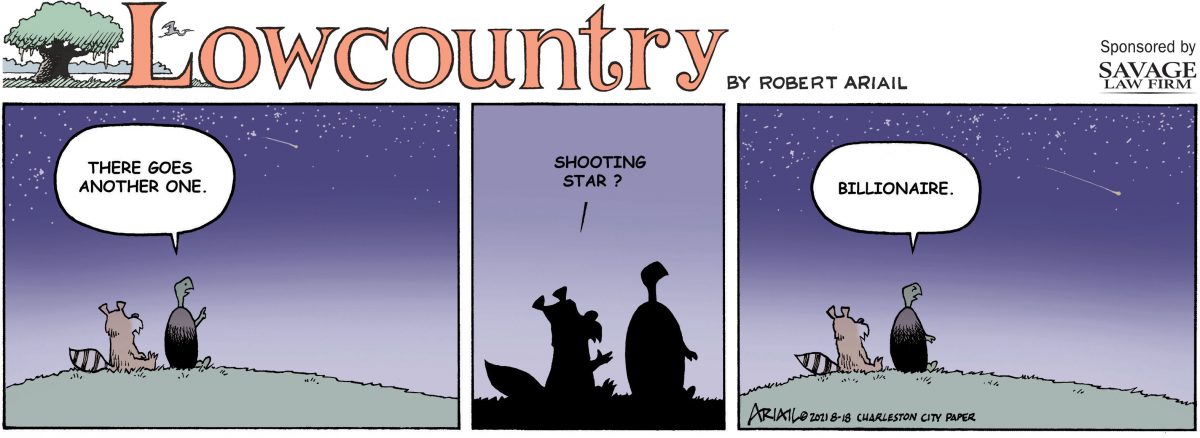
Cartoonist Robert Ariail always has an interesting take on what’s going on in South Carolina. His weekly “Lowcountry” strip is originally drawn for our sister publication, the Charleston City Paper. Love the cartoon? Hate it? What do you think: feedback@statehousereport.com. Check out the Best of Charleston 2021.
South Carolinians should expect civility, not promote incivility
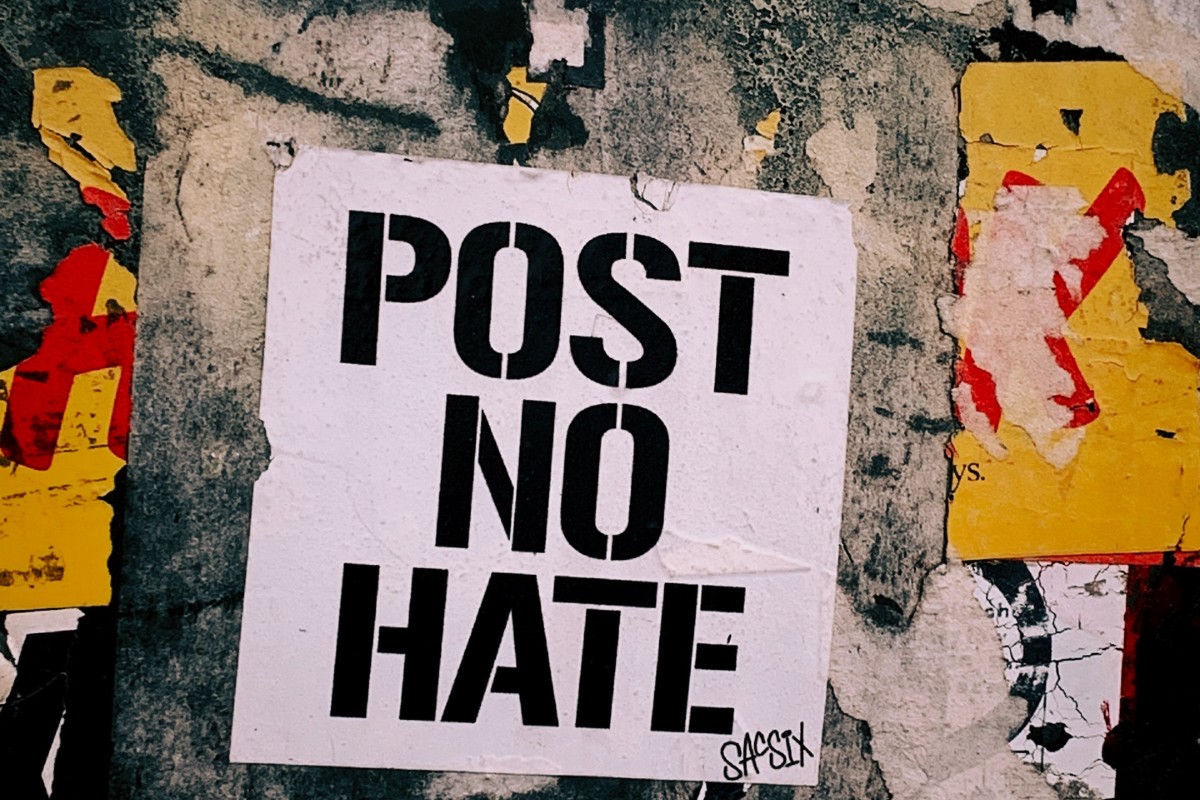
By Andy Brack, editor and publisher | Politics has always been an occasionally nasty business. Alexander Hamilton died in an 1804 duel with Aaron Burr. A South Carolina congressman caned and nearly killed a Massachusetts senator in 1856 over slavery. A mob of zealots upset by presidential election results stormed the U.S. Capitol earlier this year in an attack that led to five deaths.
 Fortunately in America, these bloody internal conflicts aren’t the norm. Unfortunately, today’s polarized and charged political environment is making it harder for leaders to govern — particularly when the leaders seem to be more worried about the next election than governing.
Fortunately in America, these bloody internal conflicts aren’t the norm. Unfortunately, today’s polarized and charged political environment is making it harder for leaders to govern — particularly when the leaders seem to be more worried about the next election than governing.
Just look at local meetings that should be routine. Political party meetings are being hijacked more often by partisans who want to wrest control of their faction from another. In the S.C. General Assembly, there’s far less personal interaction among elected officials on different sides of the aisle, leading to rancor and lack of trust. And in Charleston this week, a city council meeting over an equity report and mask mandate turned into a five-hour embarrassment of emotional outbursts.
The Charleston meeting led four state officials to make a statement decrying “appalling” behavior directed at doctors and health professionals who spoke about the need for more masking to protect the community from the spread of COVID-19.
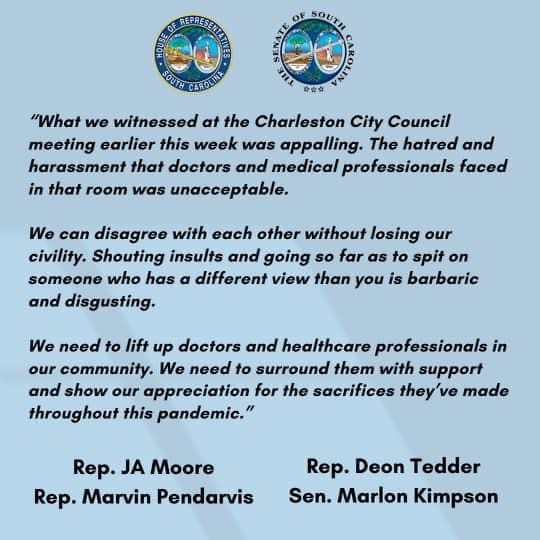 “We can disagree with each other without losing our civility,” said state Sen. Marlon Kimpson and Reps. J.A. Moore, Marvin Pendarvis and Deon Tedder, all Charleston Democrats. “Shouting insults and going so far as to spit on someone who has a different view than you is barbaric and disgusting.
“We can disagree with each other without losing our civility,” said state Sen. Marlon Kimpson and Reps. J.A. Moore, Marvin Pendarvis and Deon Tedder, all Charleston Democrats. “Shouting insults and going so far as to spit on someone who has a different view than you is barbaric and disgusting.
“We need to lift up doctors and healthcare professionals in our community. We need to surround them with support and show our appreciation for the sacrifices they’ve made throughout this pandemic.”
Unfortunately, we live in times of incivility. We all need to chill out and take a breath. Wasn’t there someone long ago who said, “Love thy neighbor as thyself?”
Two former state senators on different sides of the aisle say civility is a key to getting things done. When people with different opinions can work together to hammer out compromises in which everyone might lose a little bit, what generally emerges is something a little bit better for everyone.
“Columbia’s just becoming a mini-version of Washington in a lot of respects,” said Larry Martin of Pickens, a Republican who served in the state House and Senate from 1991 to 2016. “It’s just harder and harder for folks to get along.”
The state Senate, he said this week, once prided itself on the ability to work together to get things done.
“You couldn’t run over the minority,” he said. “You had to negotiate and you had to reach across the aisle….The danger to democracy is that people are willing to throw the law and the Constitution to the wind to get what they want. We saw that January 6. The sheer willingness to ditch the normal to get what you want — that just makes no sense to me.”
He urged newly-elected officials to try to get to know their colleagues in other parties to develop personal relationships and build trust.
Former state Sen. Phil Leventis, D-Sumter, reflected that doctors spend thousands of hours learning their profession and gaining expertise. But in politics, too many people run roughshod over learning issues and developing the expertise to participate intelligently in public debate.
“They think it is a participatory sport and that they don’t need any background because they know they’re right,” he said. “If they want to participate, they have to actually understand the playing field.”
One thing that would help, Leventis said, is if people would focus less on the liberties offered to citizens and more on their responsibilities as citizens.
“They get so hopped up about their liberties that they forget what their obligations are to the system and the process.”
Hear, hear.
- Have a comment? Send to: feedback@statehousereport.com.
ACLU of South Carolina
 The public spiritedness of our underwriters allows us to bring Statehouse Report to you at no cost. This week’s spotlighted underwriter is the American Civil Liberties Union. The ACLU of South Carolina is dedicated to preserving the civil liberties enshrined in the U.S. Constitution and Bill of Rights. Through communications, lobbying and litigation, the ACLU of South Carolina works to preserve and enhance the rights of all citizens of South Carolina. Foremost among these rights are freedom of speech and religion, the right to equal treatment under law, and the right to privacy.
The public spiritedness of our underwriters allows us to bring Statehouse Report to you at no cost. This week’s spotlighted underwriter is the American Civil Liberties Union. The ACLU of South Carolina is dedicated to preserving the civil liberties enshrined in the U.S. Constitution and Bill of Rights. Through communications, lobbying and litigation, the ACLU of South Carolina works to preserve and enhance the rights of all citizens of South Carolina. Foremost among these rights are freedom of speech and religion, the right to equal treatment under law, and the right to privacy.
Memories of an Afghan and his kites

Editor’s note: Former U.S. Rep. Bob Inglis, a Republican who represented the Upstate for six terms between 1993 and 2011, visited Afghanistan about a dozen years ago as part of his congressional duties. After the fall of the country this week to the Taliban after a 20-year war, he posted the following on Facebook and gave us permission to republish. We thought you’d appreciate his perspective.
By Bob Inglis, reprinted with permission | I keep seeing a kite on the roof of our embassy in Kabul and the eyes of an Afghan staff member at an evening event at the rooftop garden. I noticed the kite, and the handsome, young Afghan went to retrieve it for me. As he brought it to me, I asked if he grew up flying kites — as I had seen that day in a neighborhood of Kabul.

“Oh, yes,” he told me in flawless English, “It was lots of fun.”
“And you had contests, flying at each other’s kites, cutting the string?”
“Oh, yeah!” he said.
“Have you seen the movie, The Kite Runner?” I asked him.
Instantly, tears appeared in his 21-year old eyes. “They did terrible things,” he told me. “I was in the stadium when they shot a woman in the head at halftime of the soccer game.”
He told me that the Taliban had locked all the exits. Armed Taliban walked through the stands, requiring everyone to watch what was about to happen. If you tried to look away or close your eyes, you were yelled at. They took the woman — accused of some crime against their code — out to the middle of the field and shot her in the head.
“I went home and locked myself in my room,” the staff member told me. “I wouldn’t talk to anyone, not even my mom. I couldn’t eat. I couldn’t sleep. I cried and cried for days. I was just a boy.”
The next day, the ambassador presented me with a couple of kites. The staff member had gone out to get them for me — to take home to my kids in America.
If he’s lived, that staff member is now 33 or so. I pray that he’s safe. I pray that he’s made it to America. I pray that he’s not among the abandoned.
Bob Inglis is the executive director of republicEn.org, a growing group of conservatives who care about climate change.
- Have a comment? Send to: feedback@statehousereport.com
Columnist hits the nail on the head
To the editor:
![]() Regarding Andy Brack’s 8/14/2021 editorial titled “What Happened to Courage and Pride in SC?”, I would like to say thank you to Mr. Brack for hitting the nail on the head! I hope all of the selfish people in South Carolina who haven’t been vaccinated, as well as our nonchalant governor, will read this editorial.
Regarding Andy Brack’s 8/14/2021 editorial titled “What Happened to Courage and Pride in SC?”, I would like to say thank you to Mr. Brack for hitting the nail on the head! I hope all of the selfish people in South Carolina who haven’t been vaccinated, as well as our nonchalant governor, will read this editorial.
I just don’t get it. I have had restaurant owners tell me they have lost plenty of business because they require masks and gloves. Eventually, it forces the restaurant owners to relax their requirements, creating a less than safe atmosphere for all customers.
What in the world is so bad about wearing a mask into a restaurant and mask and gloves to a buffet? I have not felt any pain from doing that, and I just don’t understand. Again, I thank Mr. Brack for this editorial, and I just hope and pray it gets circulated around and falls into the hands of people that need to read it. I am going to start by posting it on Facebook.
— Donna Rabon, Marion, S.C.
Columnist needs to be nailed
To the editor:
You are a disgrace to journalism. You are nothing more than a fake news reporter who wishes to sway the public to your rationalism, and belief. Your column is full of misinformation. Did you bother to verify your fatcs [sic]? Obviously not. Lie number 1. You stated vaccines work. If true then why are so many who have been vaccinated, are now being tested positive with covid? Lie number 2. Masking works. Where did you obtain this fact from? CNN? Let me now state a fact. That you, and your idiot followers ignore. The flu has killed more people than covid, and unfortunately will continue to do so. Why is there no urgency to demand the same mandates as covid?
— Carmine Moschella, Seneca, S.C.
Send us your thoughts. We receive a few comments a week and look forward to publishing. But often we can’t because we can’t verify the identity of the writer. To be published, you’ve got to provide us with contact information so we can verify your letters. Verified letters to the editor are published weekly. We reserve the right to edit for length and clarity. Comments are limited to 250 words or less. Please include your name and contact information.
- Send your letters or comments to: feedback@statehousereport.com
House with interesting past

Here’s a South Carolina house with an interesting background. Where is it and what’s the history? Send your guess to feedback@statehousereport.com — and remember to include your name, home city and contact information.
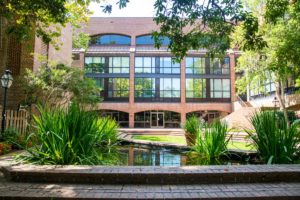 Last week’s mystery, “Brick and glass building” by Charleston photographer Ashley Rose Stanol, shows a courtyard and the Stern Student Center at the College of Charleston.
Last week’s mystery, “Brick and glass building” by Charleston photographer Ashley Rose Stanol, shows a courtyard and the Stern Student Center at the College of Charleston.
Congratulations to those who identified it: Wayne Beam of Clemson; Elizabeth Jones and Jay Altman of Columbia; and Allan Peel of San Antonio, Texas. Jacie Godfrey of Florence got the general location correct.
Peel shared, “The building was built in 1974 and was named after Theodore Sanders Stern (1912-2013), who served as the college’s 16th president from 1968 to 1974. The garden depicted in the mystery photo is in a courtyard behind the building, and it is a favorite escape for students who want some quiet studying time or wish to eat their lunch in peace. Because of its peaceful setting, some classes have been known to meet here as well.”
- Send us a mystery. If you have a photo that you believe will stump readers, send it along (but make sure to tell us what it is because it may stump us too!) Send to: feedback@statehousereport.com and mark it as a photo submission. Thanks.
ORDER NOW: Copies are in Lowcountry-area bookstores now, but if you can’t swing by, you can order a copy online today.
ABOUT STATEHOUSE REPORT
Statehouse Report, founded in 2001 as a weekly legislative forecast that informs readers about what is going to happen in South Carolina politics and policy, is provided to you at no charge every Friday.
- Editor and publisher: Andy Brack, 843.670.3996
Donate today
We’re proud to offer Statehouse Report for free. For more than a dozen years, we’ve been the go-to place for insightful independent policy and political news and views in the Palmetto State. And we love it as much as you do.
But now, we can use your help. If you’ve been thinking of contributing to Statehouse Report over the years, now would be a great time to contribute as we deal with the crisis. In advance, thank you.
Buy the book
Now you can get a copy of editor and publisher Andy Brack’s We Can Do Better, South Carolina! ($14.99) as a paperback or as a Kindle book ($7.99). . The book of essays offers incisive commentaries by editor and publisher Andy Brack on the American South, the common good, vexing problems for the Palmetto State and interesting South Carolina leaders.
More
Mailing address: Send inquiries by mail to: P.O. Box 21942, Charleston, SC 29413
Subscriptions are free: Click to subscribe.
We hope you’ll keep receiving the great news and information from Statehouse Report, but if you need to unsubscribe, go to the bottom of the weekly email issue and follow the instructions.
Read our sister publications: Charleston City Paper (every Wednesday) | Charleston Currents (every Monday).
© 2021, Statehouse Report, a publication of City Paper Publishing, LLC. All rights reserved.

















 We Can Do Better, South Carolina!
We Can Do Better, South Carolina!
Pingback: Statehouse Report NEW for 8/20: On vaccination language, civility and kites – Statehouse Report | Prometheism Transhumanism Post Humanism